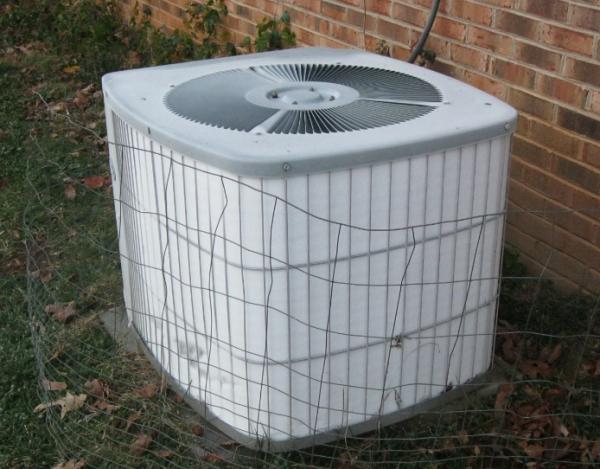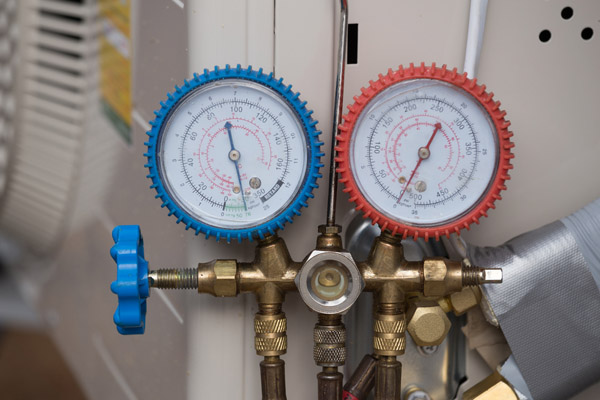Do you have a problem with ice buildup on your air conditioner? It can be frustrating having to deal with this issue, but luckily there are some simple steps you can take to get your air conditioner running smoothly again. Keep reading to find out how to deal with ice forming on AC coils.
What is the ice buildup on your AC unit?

Ice buildup on an air conditioner unit is a common problem and can lead to a variety of serious issues. It is important to be proactive in dealing with ice buildup on your air conditioner, as it can cause damage to the unit or even cause it to shut down entirely. To understand why your air conditioner can freeze up on a hot summer day, it is important to know how an AC works.
The Joule-Thomson effect explains that gases change temperature when compressed or expanded. This process enables the AC’s refrigerant to absorb heat from indoors and move it outside. For the system to run optimally, there needs to be good airflow and the right amount of refrigerant in the unit. When too little airflow or refrigerant is present, temperatures near the evaporator and condenser coils drop below freezing point, causing water vapor around them to turn into ice. Eventually, the ice can build up until it completely covers the coils and blocks them from absorbing any more latent heat. The result is an icy frozen air conditioner unable to function properly.
What are the causes of ice on your air conditioner?

Ice buildup on your air conditioner is a common issue that can cause your system to become inefficient and even stop working altogether. The most common causes of ice buildup on your air conditioner are a lack of maintenance, a dirty air filter, or a refrigerant leak. These issues can lead to reduced airflow, improper drainage, and a clogged evaporator coil.
Dirty air filters restrict air flow and can cause the evaporator coil to freeze, which in turn can lead to excessive ice buildup. Clogged evaporator coils can also cause ice buildup as they can reduce the efficiency of the system and stop the refrigerant from evaporating properly. A blocked condenser coil can cause ice buildup as the heat exchange process is inhibited, leaving the air conditioner unable to expel heat. Finally, when the refrigerant levels are low, the evaporator coils get too cold and cause the air conditioner to freeze over.
The most common symptom of ice buildup on your air conditioner is a decrease in cooling power. This can lead to decreased efficiency and higher energy bills. If the issue is left unchecked, the ice buildup can become a blockage, preventing air from flowing properly through the unit. This will cause the air conditioner to run longer and consume more energy.
How can you remove and prevent ice buildup on the ac unit?
When facing ice buildup on your air conditioner, it is best to simply turn off the unit and let the ice thaw for a few hours. To speed up this process, you can use a heat gun or hair dryer set to its highest setting. You’ll want to avoid using an ice pick or any other sharp object as that could cause harm to your evaporator coil or condenser coil.
Once the ice melts, you’ll want to determine the cause of the buildup. This may be a result of a dirty air filter, a low charge of refrigerant, or blocked airflow. The most important step is to keep your AC unit clean and free of debris. Leaves, dirt, and other debris can obstruct airflow and cause the unit to freeze up. Regularly cleaning the condenser coil and the area around the outdoor unit can help keep the system free of debris.
Another important step is to check and replace the air filters regularly. Most AC experts suggest changing your filters at least every three months to prevent airflow issues. Additionally, changing your air filters regularly can help improve your indoor air quality. Finally, it’s important to have your HVAC system serviced regularly by a professional technician in order to ensure adequate refrigerant levels and optimal performance.
It is important to take measures to prevent ice buildup on your air conditioner, as this can cause reduced efficiency, higher energy bills, and system failure. The best way to ensure your air conditioner is running optimally is to clean the unit regularly and inspect the coils.
Read More:

